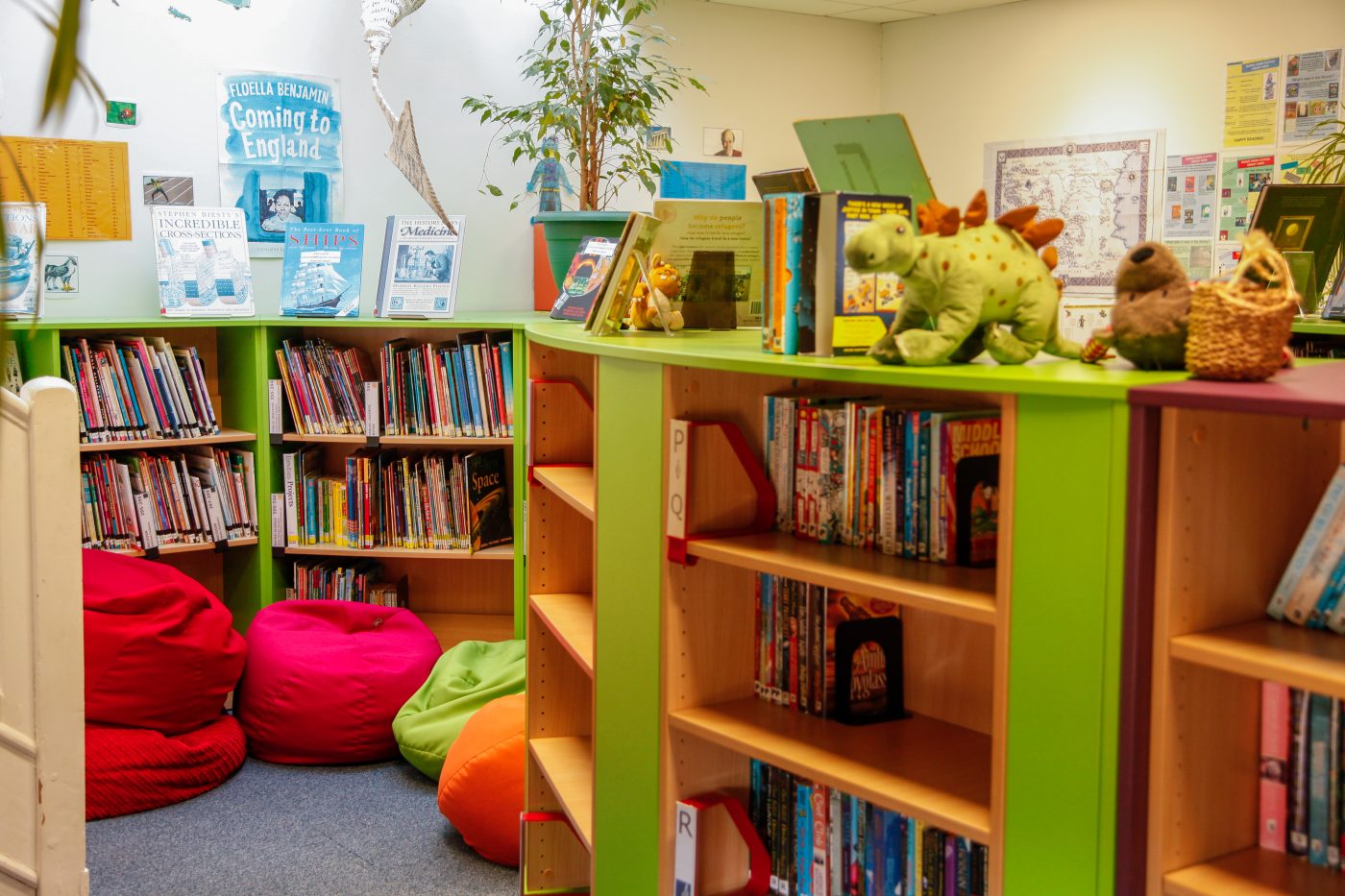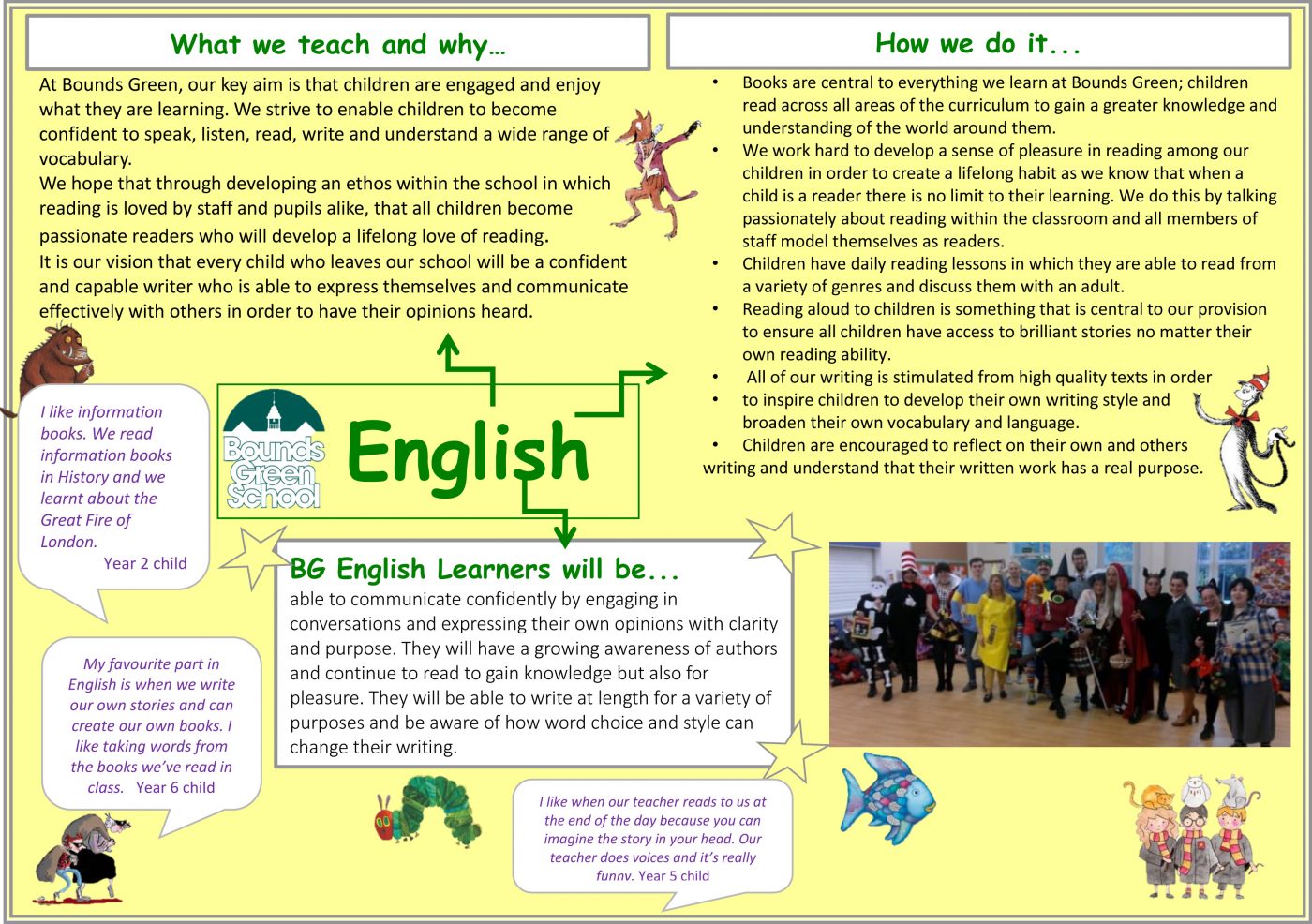English

English
Bounds Green is a happy and successful school community because:
· We NURTURE each unique child to value themselves and develop self-worth in order to thrive in life.
· We VALUE respect and responsibility, individuality and inclusivity, confidence and kindness.
· We CHALLENGE every child to be ambitious and achieve success in their learning.
Intent
At our school we are determined to provide a learning environment filled with high-quality, diverse and challenging texts which will enable learners to:
- Benefit from an accredited, rigorous synthetic phonics programme begun as soon as possible in Early Years which will set the basis for reading and writing for life.
- Become fluent and confident readers regardless of their starting point, background, needs or abilities.
- Be able to talk about a diverse range of books in different ways with confidence
- Engage with a wider genre of books which will grow their vocabulary
- Read and respond to a wide variety of texts
- Develop cultural capital through the use of knowledge and vocabulary learned across the curriculum, in order to access a variety of texts.
- Develop a love of reading that continues well into secondary school and adulthood
- Catch up and keep up, regardless of whether they are new to the school or new to English.
Implementation
In order to achieve our intentions, we provide children with:
- Daily phonics using the Little Wandle Letters and Sounds Programme in Early Years and into Year 1.
- Guided reading sessions four times per week in year 2-6 which include whole class teaching of reading within the sequence of lessons.
- Books at a higher level compared to their reading ability when reading with a teacher in order to provide challenge.
- Banded books which are carefully matched to their current reading levels to read in class. In Years 1 and 2, these books are taken home to read with parents. Reading records are used to encourage parent-school communication and to monitor reading progress. In Years 3-6, teachers encourage children to take books home from reading areas which are at an appropriate level to the reader’s needs.
- Time to read with their teacher at least once every two weeks as well as attempt Rising Stars comprehensions on a variety of texts. Questions are SATs-style and meticulously linked to the reading skills outlined by the new National Curriculum.
- Extra support for children (including those new to English and the school) through targeted small group intervention 2-3 times per week by trained staff.
- The opportunity to visit and use the school library once per week – encouraging the borrowing of books and reading for pleasure. Teachers also recommend and promote high-quality texts for children to take home and read – in order to foster a love of reading and appreciation of quality literature.
- Timetabled story time in both key stage 1 and 2 at least twice per week. Children are never too old to be read to, no matter their age, and this is where appropriate yet challenging texts are read to children to encourage listening skills, a love of reading and an appreciation of expression and tone of voice. As experienced readers, we endeavor to entertain and model story-telling and text engagement to our learners.
- Reading areas which are comfortable, welcoming and filled with high-quality and diverse texts from a range of genres (fiction, poetry and non-fiction) to encourage a love of reading.
- Stimulating and challenging Core Texts which expose children to new and wide vocabulary as well as a range of diversity books (such as the Little People, Big Dreams series) to encourage building of cultural capital.
- A breadth of cross-curricular texts with geographical, historical and scientific themes, with the diverse language that comes with them which enable learners to apply what they have learned in other subjects to their understanding of new texts.
Impact
Through the teaching of systematic phonics, our children will become fluent readers by the end of Key Stage One. This way, they will focus on developing their fluency and comprehension as they move through the school. Attainment in reading will be measured using the statutory assessments at the end of Key Stage One and Two. These results will be in line with, and above, the reading attainment of children nationally. Attainment in phonics will be measured by the Phonics Screening Test at the end of Year 1.
We firmly believe that reading is the key to all learning and so the impact of our reading curriculum goes beyond the results of the statutory assessments. Children will have developed a love for reading that continues into adulthood. Children will have acquired a wide range of vocabulary and concepts, which they will use to interact with the wider world.
Bounds Green Reading Curriculum
Little Wandle Foundations for Phonics
Little Wandle Foundations for Phonics_Planning and Overview
Bounds Green Spelling Curriculum Overview
Bounds Green Phonics and Early Reading Policy
Year 1 Phonics Programme Overview

